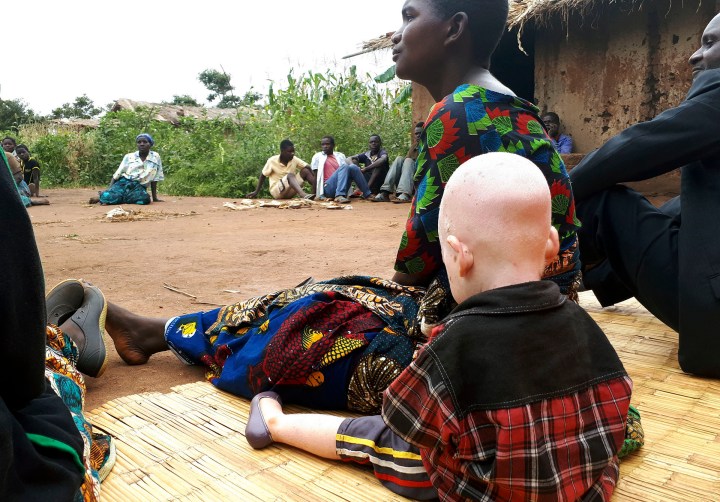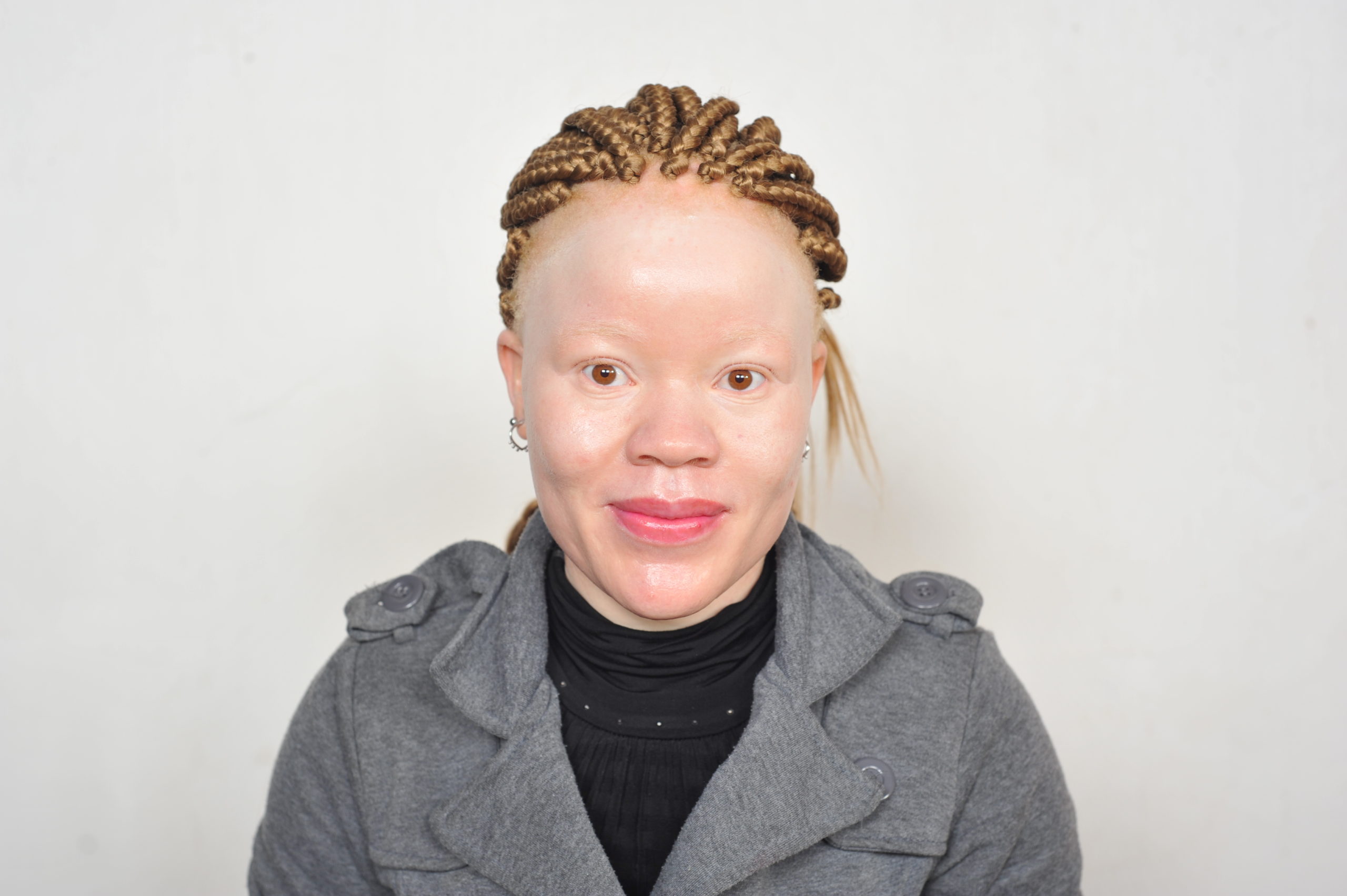Southern Africa: Human Rights Roundup #13
Persons with albinism further marginalised and discriminated in Covid-19 response

The Southern Africa Human Rights Roundup is a weekly column aimed at highlighting important human rights news in southern Africa. It integrates efforts of human rights defenders and facilitates evidence-based engagement with key stakeholders and institutions on the human rights situation across the region. The weekly roundup is a collaboration between the Southern Africa Human Rights Defenders Network and Maverick Citizen.

The author of this article Tumeliwa Mphepo (Photo supplied)
Persons with albinism (PWAs) are among the most vulnerable people affected by emergency measures implemented by governments to control the spread of Covid-19 in southern Africa. Many public services have been severely limited, if not completely halted, leaving people with disabilities abandoned and without access to essential healthcare and social services.
Many PWAs have gone for months without much-needed supplies, particularly sun-protection creams that guard their skins against burns that can become cancerous. Additionally, PWAs are struggling to access healthcare facilities for skin cancer testing and treatment, or for treatment for visual impairments. This week’s roundup focuses on people with albinism and the impact of Covid-19 on their situation.
Persons with albinism
According to UN data, albinism – a congenital condition characterised by the absence of pigment in the skin – is prevalent in North America (one in 20,000) and in Europe (one in 17,000).
The condition is much more prevalent in sub-Saharan Africa: estimates are of one in 1,400 people being affected in Tanzania and as high as one in 1,000 in select populations in Zimbabwe and other specific ethnic groups in southern Africa. In Malawi, there are more than 134,000 people with albinism, representing 0.8% of the total population, according to the national statistics office in 2018.
Albinism in the Covid-19 era:
The Covid-19 pandemic is reported to have made the life of people with albinism more challenging, as their care has been considered less crucial or essential compared to the general population. Coumba Makalou, head of the Salif Keita Global Foundation for people with albinism, noted that as funding for non-profits and specialised programmes affected by new economic hardships and layoffs decline, programmes for people with disabilities may be the first to be cut.
“For example, as the head of a non-profit which supports people with albinism in Mali, the main dermatology centre in which our patients receive care is temporarily not accepting patients. Therefore, crucial skin cancer screenings and treatments are terminated indefinitely, leaving our members with no alternative care and at risk of dying from pre-existing conditions,” he said.
Pre-existing abuses of the rights of PWAs, who already face multiple forms of discrimination worldwide, have therefore been accelerated by Covid-19.
Scapegoating, discrimination and exclusion
An international survey to monitor state measures concerning persons with disabilities amid the pandemic, launched by the Covid-19 Disability Rights Monitor (DRM) on 20 April 2020, revealed grave and systemic violations of fundamental freedoms and human rights of persons with disabilities.
In some sub-Saharan African countries like Malawi and Tanzania, albinism has traditionally been shrouded in myth and dangerous and erroneous beliefs. There have been hundreds of cases of attacks and killings of persons with albinism reported in 28 countries in sub-Saharan Africa in the past decade.
The attacks have several root causes, including ignorance, longstanding stigma, poverty and, most abhorrently, harmful practices to do with belief in witchcraft. Women with albinism have reported being raped by those who believe they are the cure for AIDS and infertility.
Since 2014, approximately 151 persons with albinism have been killed in countries such as Malawi, Mozambique, Tanzania and Zambia, for their body parts. There have also been reports of killings in South Africa, although such crimes are less common there.
The arrival of Covid-19 resulted in PWAs being scapegoated and stigmatised in some countries, due to their colouring and appearance. According to Thomson Reuters Foundation, the rumour that PWAs are to blame for Covid-19 could fuel stigma against those living with albinism. They have reportedly been wrongly perceived as “foreigners” and have been singled out and taunted with names such as “Coronavirus” and “Covid-19”.
Persons with albinism lack access to accurate information about their condition vis-à-vis Covid-19. Unfortunately, not much is being done to ensure information about the virus is distributed in accessible formats or to engage people with disabilities.
The World Health Organisation has described this as an “infodemic” which could put those in remote and rural areas, with no access to the internet and little education, at greater risk.
In April 2020, the Legal and Human Rights Centre, a human rights advocacy organization in Tanzania, expressed alarm over a lack of availability of sufficiently accurate and timely information for persons with disabilities. The organisation highlighted the importance of increasing access to information on Covid-19 infections in line with article 18 of the constitution of Tanzania, which guarantees the right of access to information.
While some governments have provided food aid and stimulus packages to help vulnerable people cope with the pandemic, reports indicate that, in some countries, persons with albinism have been excluded from accessing state aid, such as social grants, due to criteria that do not view their condition as a disability.
For example, in Malawi, Amnesty International reported that persons with albinism were often excluded from registering for government poverty alleviation programmes.
Yet other hardships for persons with albinism, many of whom are already amongst the poorest and most vulnerable in society, include a severe lack of access to basic necessities such as food – a situation worsened by the economic impact of Covid-19 and mostly affecting women and children.
Ikponwosa Ero, the UN Independent Expert on the enjoyment of human rights by persons with albinism says: “Due to abandonment by their spouses or partners upon the birth of the child with albinism, and the ensuing situation of being a single parent, mothers of children with albinism often face abject poverty. This exposes the child with albinism to continuous poverty, especially as the child is generally unable to receive a proper education or, thereafter, opportunities for gainful employment.”
Amnesty International has also raised concern that persons with albinism are at increased risk of attacks for their body parts during lockdowns because they are locked down in insecure homes and communities with suspected perpetrators.
It encourages governments to pay special attention to persons with albinism. In the words of Tigere Chagutah, Amnesty International’s deputy director for southern Africa: “We know marginalised groups have greater difficulty exercising their human rights, including accessing healthcare and livelihoods in normal times. They are so much more vulnerable during a pandemic.”
Weak legislation and institutions exacerbating plight of people with albinism
On 13 June 2013, the UN Human Rights Council adopted the first resolution on albinism after noting abuse of persons with albinism. In its resolution, the UNHRC pushed for the prevention of attacks and discrimination and recommended that 13 June be made International Albinism Awareness Day.
The UN has also specifically addressed the treatment of albino children in Tanzania, condemning that country’s method of protecting children with albinism — by segregating them from the larger community — as not in the best interest of the children. The organisation has, however, been criticised for not doing anything else to assist with the situation.
In southern Africa, a Regional Action Plan on Albinism (2017-2021) was developed, with objectives divided into four clusters, namely: prevention, protection, accountability and equality and non-discrimination. The Regional Action Plan is the first continental response to the scourge of attacks and discrimination against persons with albinism.
It is disheartening to note that only Malawi has domesticated this document through its National Action Plan on Persons with Albinism (2018-2022). In a statement issued in June by the Albinism Society of Botswana, the government of Botswana was accused of failing to provide space for people with albinism to exercise their voice and join in decisions that leave no one behind. The Zimbabwe Albino Association has reportedly been lobbying parliament to enact a law that makes it mandatory for the government to provide free skin lotions to people with albinism.
With weak legislation and institutions to protect them, PWAs will continue to endure discrimination and stigmatisation. Even as they battle social and cultural challenges, they are faced with a new wave of discrimination associated with the Covid-19 pandemic.
Regional authorities are therefore encouraged to introduce more proactive and actionable measures that guarantee PWAs a life free of violence, discrimination and fear. Even after Covid-19, there are fears PWAs will face more discrimination and exclusion.
According to the “2020 Global Education Monitoring Report”, released on 23 June by the UN Educational, Scientific and Cultural Organisation (Unesco), teachers returning to school in sub-Saharan Africa may be hampered by fear, including fear of children with albinism, in the classroom.
Conclusion
PWAs were already experiencing myriad challenges pre-Covid-19, but the pandemic has exacerbated their condition in many ways. From discrimination, food insecurity, difficulty in accessing supplies and a trampling of their rights, PWAs are a forgotten and neglected population in the coronavirus haze.
As recommended by Amnesty International, “Authorities must ensure that measures to respond to Covid-19 are inclusive of the specific needs of persons with albinism, including provision of sunscreen lotions, enabling access to information, increasing community policing and improving access to social protection in order to maintain their health, safety, dignity and independence during and post the Covid-19 pandemic.” DM/MC
Tumeliwa Mphepo is a woman human rights defender and a member of the Association of Persons with Albinism in Malawi (APAM) where she works as a monitoring & evaluation officer. APAM is a non-governmental organisation that envisions a community of persons with albinism enjoying human rights and sustainable livelihoods fully.



















 Become an Insider
Become an Insider